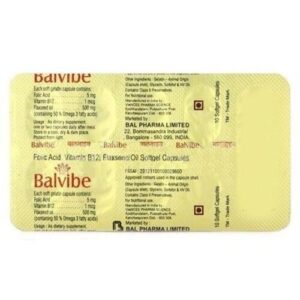FOLIC ACID + VIT B12 + FLAXSEED OIL CAP
Folic Acid: Folic acid, also known as vitamin B9, is a synthetic form of the water-soluble vitamin folate. It is commonly used as a dietary supplement and in the treatment of folate deficiency or conditions that require increased folate levels.
Folic acid plays a vital role in various biological processes, particularly in the production of red blood cells, DNA synthesis and repair, and cell division. It is essential for the proper development of the fetus during pregnancy and is also important for the maintenance of overall health.
Folic acid works by being converted into its active form, methyltetrahydrofolate, in the body. This active form acts as a coenzyme in several enzymatic reactions that are involved in the metabolism of amino acids and the production of DNA.
The recommended daily dose of folic acid varies depending on age, sex, and certain medical conditions. For adults, the usual daily dose ranges from 400 to 800 micrograms. During pregnancy, the recommended dose increases to 600 to 800 micrograms. It is important to consult a healthcare professional for personalized dosage instructions.
Folic acid is generally safe and well-tolerated when taken at recommended doses. However, like any medication, it can cause side effects. Common side effects may include nausea, abdominal cramps, diarrhea, and rash. In rare cases, allergic reactions may occur, characterized by symptoms such as itching, swelling, dizziness, and difficulty breathing. High doses of folic acid may mask a vitamin B12 deficiency, so it is important to ensure adequate intake of both vitamins to prevent potential complications.
It is worth noting that folic acid supplementation may interact with certain medications, including antiepileptic drugs, methotrexate, and sulfasalazine. It is advisable to inform your healthcare provider about all medications you are taking to minimize the risk of drug interactions.
Overall, folic acid is a widely used and important nutrient that is crucial for various biological functions. It is commonly available over-the-counter as a dietary supplement and is also a component of many multivitamin preparations. However, it is always recommended to consult with a healthcare professional before starting any new medication or supplement regimen.
Vit B12: Vitamin B12, also known as cobalamin, is a water-soluble vitamin essential for the proper functioning of the nervous system, the formation of red blood cells, and the metabolism of fatty acids and amino acids in the body. It is naturally found in animal products like meat, eggs, and dairy, and can also be obtained through supplements.
The primary use of Vitamin B12 is to treat and prevent vitamin B12 deficiency. Deficiency can occur due to various factors such as poor diet, malabsorption issues, or certain medical conditions. Symptoms of deficiency can include fatigue, weakness, tingling or numbness in the extremities, poor balance, memory problems, and mood disorders.
Vitamin B12 functions by being converted into an active form called methylcobalamin or adenosylcobalamin, which are essential coenzymes involved in several metabolic processes. It helps in the production of DNA, red blood cells, and the formation of myelin sheath around nerve fibers.
The dose of Vitamin B12 varies depending on the individual’s age, sex, and the severity of the deficiency. Generally, the recommended daily intake for adults is 2.4 micrograms. In cases of deficiency or medical conditions that hinder absorption, higher doses may be prescribed, either orally or through injections.
While Vitamin B12 is generally considered safe and well-tolerated, some possible side effects can occur. These side effects are rare and usually occur when taken in high doses. They may include diarrhea, itching, rash, or mild headache. Rarely, allergic reactions may occur that require immediate medical attention.
It is important to note that Vitamin B12 supplements should not be used as a substitute for a balanced diet unless a deficiency has been diagnosed by a healthcare professional. If you suspect a deficiency or are considering taking Vitamin B12 supplements, it is advisable to consult with a healthcare provider to determine the appropriate dosage and course of treatment.
Flaxseed Oil Cap: Flaxseed Oil Capsules contain flaxseed oil extracted from the seeds of the flax plant. They are commonly used as a dietary supplement to provide essential fatty acids, particularly omega-3 fatty acids, to the body. Flaxseed oil is rich in alpha-linolenic acid (ALA), which is considered a healthy fat.
The primary mechanism of action of Flaxseed Oil Capsules is related to the omega-3 fatty acids present in the oil. Omega-3 fatty acids are known to have anti-inflammatory properties and can help in reducing inflammation in the body. They also play a role in maintaining cardiovascular health, promoting brain function, and supporting skin and joint health.
The typical recommended dose of Flaxseed Oil Capsules is 1-2 capsules per day, usually taken with a meal. It is essential to follow the dosage instructions provided by the manufacturer or as directed by a healthcare professional.
While Flaxseed Oil Capsules are generally safe for most people when taken in appropriate doses, some individuals may experience side effects. These side effects are usually mild and can include gastrointestinal disturbances such as bloating, gas, and diarrhea. Rarely, allergic reactions may occur in individuals with an allergy to flaxseed or other seeds.
It is important to note that flaxseed oil may interact with certain medications, such as blood thinners and cholesterol-lowering drugs. Therefore, it is recommended to consult a healthcare professional before starting any new dietary supplement, especially if you are taking medications or have any underlying health conditions.
Overall, Flaxseed Oil Capsules can be an effective dietary supplement to support overall health and provide essential fatty acids to the body. However, as with any supplement, it is best to consult with a healthcare professional for personalized advice based on individual needs and considerations.

